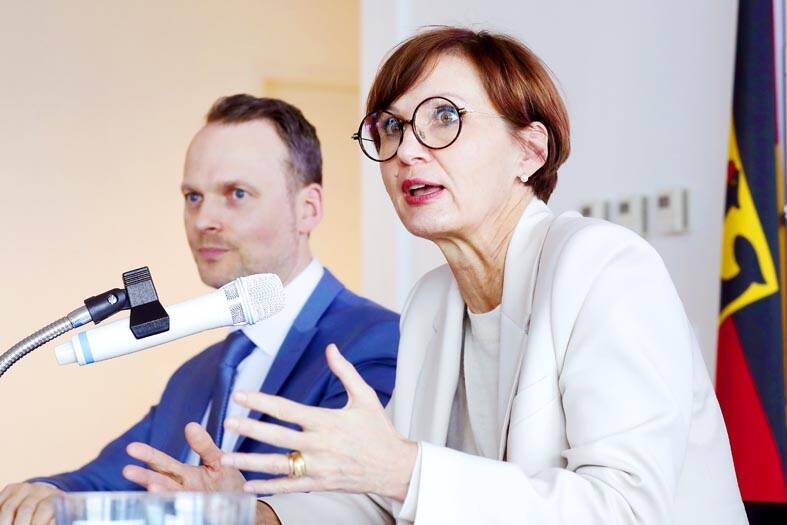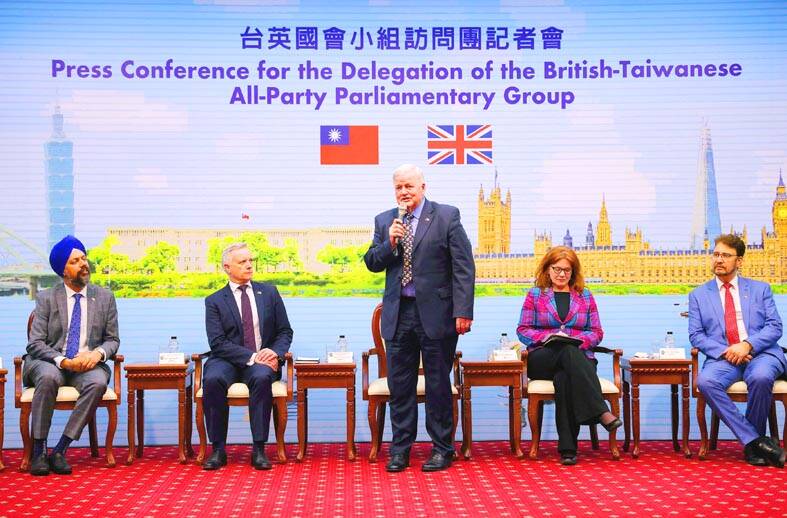Visiting German Minister of Education and Research Bettina Stark-Watzinger yesterday said that “professional exchanges” were the focus of her trip to Taiwan, not China.
Amid criticism from Beijing, the minister told reporters in Taipei that her visit was in line with Berlin’s China policy, adding that she expected it to be “transparent and professional with no surprises.”
Stark-Watzinger said she had consulted German Chancellor Olaf Scholz and the nation’s foreign minister before her visit.

Photo: AP
“Our focus is professional exchanges and the issue of China is not the topic here,” she said.
The first German federal minister to visit Taipei since 1997 said that while such trips could become “routine,” the decision on whether to travel to Taiwan would be for individual ministers to decide.
Germany and Taiwan face similar challenges with regard to a brain drain in the semiconductor field, she said, adding that regular exchanges with a partner that shares the same values of democracy and the rule of law are a must.

Photo: Annabelle Chih, Reuters
Stark-Watzinger’s 14-member delegation earlier yesterday met with Minister of Education Pan Wen-chung (潘文忠) to exchange views on Chinese-language education and academic semiconductor institutions.
The two discussed cooperation in Chinese-language education, including inviting German officials to Taiwan for language training and subsidizing Taiwanese teachers’ stay in Germany, the Ministry of Education said.
On Tuesday, Chinese Ministry of Foreign Affairs spokesman Wang Wenbin (汪文斌) expressed Beijing’s “strong disapproval” of Stark-Watzinger’s “reprehensible” act of visiting Taipei.
“We call on the German side to respect the ‘one China’ principle, immediately stop interacting and sending the wrong signals to the ‘Taiwan independence’ separatist forces,” Wang said.
German Minister of Finance Christian Lindner yesterday wrote on Twitter that the creeping loss of democracy and freedom worldwide must not be the price for cooperating with China.
That is why Stark-Watzinger’s engagement on the issue deserves respect, he wrote, with a link to an announcement about the opening of the Friedrich Naumann Foundation for Freedom’s hub in Taipei.
Separately yesterday, visiting British lawmaker Bob Stewart said that the UK should provide Taiwan with as much help as possible to defend itself.
Speaking at a news conference in Taipei, the cochair of the British-Taiwanese All-Party Parliamentary Group confirmed that issues related to the UK providing Taiwan with equipment for its indigenous defense submarine program were covered when they met with National Security Council Secretary-General Wellington Koo (顧立雄).
“It came up, in part,” Stewart said.
Stewart would not reveal details of the conversation, but said the message the delegation would take back to the British parliament is that “we should assist Taiwan in its defense as much as possible.”
Reuters published a report on Monday last week saying that the value of licenses the British government granted to companies for the export of submarine-
related components and technology to Taiwan totaled a record £167 million (US$205 million) during the first nine months of last year, more than the previous six years combined.
Asked about the report, Stewart said he “fully supports the idea.”
He did not elaborate, saying he is not part of the government.
In his opening remarks, Stewart praised Taiwan for its democratic development.
“What you have achieved in this country over 30 years is nothing more than miraculous, 30 years and you are now rated higher in democratic values than a country like my own which has had 800 years and still we can’t get it right,” he said.
The six-member British parliamentary group he is leading arrived in Taiwan on Sunday for a six-day visit.
Additional reporting by Reuters

Seventy percent of middle and elementary schools now conduct English classes entirely in English, the Ministry of Education said, as it encourages schools nationwide to adopt this practice Minister of Education (MOE) Cheng Ying-yao (鄭英耀) is scheduled to present a report on the government’s bilingual education policy to the Legislative Yuan’s Education and Culture Committee today. The report would outline strategies aimed at expanding access to education, reducing regional disparities and improving talent cultivation. Implementation of bilingual education policies has varied across local governments, occasionally drawing public criticism. For example, some schools have required teachers of non-English subjects to pass English proficiency

‘FORM OF PROTEST’: The German Institute Taipei said it was ‘shocked’ to see Nazi symbolism used in connection with political aims as it condemned the incident Sung Chien-liang (宋建樑), who led efforts to recall Democratic Progressive Party (DPP) Legislator Lee Kun-cheng (李坤城), was released on bail of NT$80,000 yesterday amid an outcry over a Nazi armband he wore to questioning the night before. Sung arrived at the New Taipei City District Prosecutors’ Office for questioning in a recall petition forgery case on Tuesday night wearing a red armband bearing a swastika, carrying a copy of Adolf Hitler’s Mein Kampf and giving a Nazi salute. Sung left the building at 1:15am without the armband and apparently covering the book with a coat. This is a serious international scandal and Chinese

TRADE: The premier pledged safeguards on ‘Made in Taiwan’ labeling, anti-dumping measures and stricter export controls to strengthen its position in trade talks Products labeled “made in Taiwan” must be genuinely made in Taiwan, Premier Cho Jung-tai (卓榮泰) said yesterday, vowing to enforce strict safeguards against “origin laundering” and initiate anti-dumping investigations to prevent China dumping its products in Taiwan. Cho made the remarks in a discussion session with representatives from industries in Kaohsiung. In response to the US government’s recent announcement of “reciprocal” tariffs on its trading partners, President William Lai (賴清德) and Cho last week began a series of consultations with industry leaders nationwide to gather feedback and address concerns. Taiwanese and US officials held a videoconference on Friday evening to discuss the

PERSONAL DATA: The implicated KMT members allegedly compiled their petitions by copying names from party lists without the consent of the people concerned Judicial authorities searched six locations yesterday and questioned six people, including one elderly Chinese Nationalist Party (KMT) member and five KMT Youth League associates, about alleged signature forgery and fraud relating to their recall efforts against two Democratic Progressive Party (DPP) legislators. After launching a probe into alleged signature forgery and related fraud in the KMT’s recall effort, prosecutors received a number of complaints, including about one petition that had 1,748 signatures of voters whose family members said they had already passed away, and also voters who said they did not approve the use of their name, Taipei Deputy Chief Prosecutor